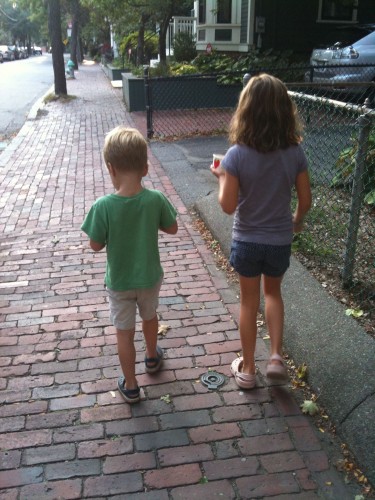Things whose days are numbered:
1. The Sweet Dreams Head Rub and Ghostie Dance being enough to assure happy slumber for both kids
2. Sitting on the floor of the gym, a child on my lap, singing our hearts out at the Pre-K, K, and 1st grade holiday sing-a-long at school
3. Whit wearing little briefs printed with robots, dinosaurs, and boats
4. Carrying Whit to bed after taking him to the potty at 10pm. His legs already dangle alarmingly near my knees
5. Grace happily holding my hand walking down the street
6. Buckling carseats
7. Two children in the bath together
8. Shopping for clothes at Baby Gap
9. Whit picking Goodnight Moon for me to read to him before bed
10. Grace’s sheer wonder at a visit from the tooth fairy
Honestly, the truth of this makes my heart throb. Makes it ache as though it might split open, like an overripe peach. How do others handle this, the irrefutable drumbeat march of time? There’s no question this is my rawest wound. It is a cord of feeling that vibrates painfully inside me and a shadow that haunts the edges of even the sunniest day.
Adrienne Rich asserts of Marie Curie that “her wounds came from the same source of her power.” I’m still trying to ascertain exactly how my deep hurt about the impermanence of things might also be a strength. I am not at all clear on how the source of this churning well of feeling to which I return again and again could also be a source of power, strength, confidence.
I want my heart to dwell here, in the rooms of my days. I can only recommit, every single day to trying to remember that, to tugging myself back to now. I do that even knowing full well my own tendency to mourn an experience even as I’m still in the midst of living it. I wish I could stop grieving that which will be soon gone, but I’m not sure I can. Most of our last times happen without us knowing, slipping into the past tense in the narrative of our lives almost unnoticed. I am more aware than many of this, but even so I fail to mark these transitions all the time.
So, here I go, into the season of white lights and carols, paperwhites and holiday cards, eyes and heart wide open. This may be the last year that Grace believes in Santa Claus. May be the last year Whit wears a Baby Gap sweater. May be the last year they both cite that baking cookies with me is their very favorite thing to do. More numbered days. They all are, though, aren’t they?

